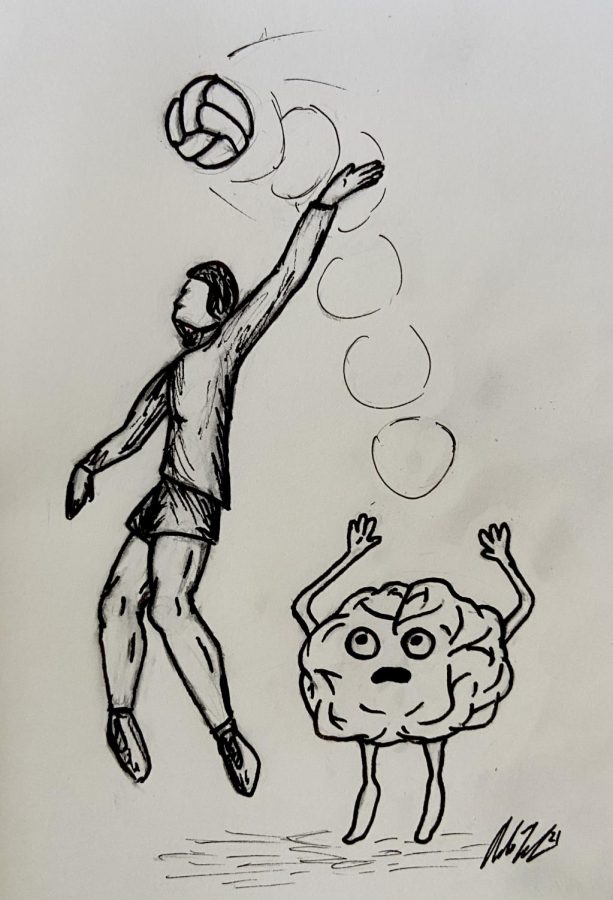An exploration of the relationship between mental health and sports
The relationship between playing sports and physical health is cut and dry; those who play sports are, on the whole, healthier. However, the connection between athletes and mental health is far more obscure. While some can rely on sports for relaxation and self-confidence, others become overwhelmed by stress and question their self-worth. Where an athlete falls on the spectrum of positive and negative mental health effects all boils down to the individual.
Exercise itself is the root of both the physical and mental health benefits competitive sports offer. Exercise offers a massive boon to physical strength as it strengthens bones and muscles, reduces the risk of chronic diseases, and assists in weight management. Furthermore, exercise strengthens athletes mentally by weakening the symptoms of stress and depression. The stress relief is caused by the endorphins that the body releases during physical activity, which reduce the perception of pain. Only 20 to 30 minutes of exercise is needed for endorphins to reduce stress hormones, but this soothing state can continue for hours after an athlete has finished exercising. Sports also assist athletes in easing symptoms of depression and anxiety by distracting them from their worries, enhancing their social life, and shaping their sense of self-confidence.
An athlete’s mental health often depends on their performance and improvement in the sport. When athletes feel they are progressing skill-wise or are performing well in competitions, their confidence and mood will improve a result, or vise versa. Growing as a player is what keeps sophomore volleyball and tennis player Jojo Wren interested in athletics.
“I think they’re very impactful in a positive way,” Wren said. “Sports help me shift my focus, and working towards something like a skill or a game is really fun for me.”
Those who partake in team sports also gain the advantage of increased social interaction. Athletes who play in a more social environment may see an increase in confidence, as encouragement from teammates can improve self image. Junior and soccer player Amy Loeffler’s self-esteem thrives when she is surrounded by her teammates.
“Playing on a team with people who support you and always have your back is an experience not everyone gets,” Loeffler said. “If I ever have a problem, soccer is the one place I can go and not have to think about it when I’m with my teammates. Having all that support really raises your confidence.”
Unfortunately, many athletes have found team sports to be a source of stress and suffer from poor self-perception as a result. This is very common for highly competitive athletes, who are often placed under pressure to maintain a specific image to heighten athletic performance. In a study focusing on female Division 1 NCAA athletes, over a third of the participants recorded behavior and symptoms that placed them at risk for developing anorexia nervosa. Team sports inevitably foster a competitive environment, where athletes can find themselves comparing their abilities and bodies to their fellow teammates. While sophomore water polo player Eden Moore feels encouraged by her teammates, she still battles an internalized sense of competition.
“I think water polo has definitely kept me in shape and helped me feel better about myself, but also when playing a swim sport, you definitely find yourself comparing yourself to the other girls,” Moore said.
Beyond body image issues, athletes can become consumed by the commitment of their sport. Many student athletes struggle to balance school work, sports, and social life, which often leads to increased stress and poor sleep quality. Some also rely on sports as their main mental health outlet, and will struggle to adapt when it is taken away. This experience can happen to those who sustain a major injury, or are cut from a team. Last year, many athletes were prevented from participating in their sports because of quarantine safety orders. After she was separated from her volleyball teammates last spring, Jojo Wren experienced a complete shift in her mindset. Having lost the socialization that came with weekly practices and tournaments, she found herself becoming unhappy.
“When I wasn’t doing sports I felt more sad because I didn’t have it as an outlet, and I don’t really exercise as much without sports,” Wren said. “Also, seeing teammates is so important to me, so not having practice was no fun.”
The relationship between athletics and mental health is unique for every athlete. Individual experiences are key to building this connection, as they are what makes the mental health effects and their extent vary. While an athlete’s feelings towards their sport are never constant, it remains important to prioritize mental health and recognize when balance is needed.
Hello there! Our goal is to provide relavent, engaging journalism for readers of all ages. Your donation will support the student journalists of the Wolfpacket at Claremont High School, and will allow us to purchase equipment, print our monthly issues, and enter in journalism competitions. We appreciate your consideration!

Melina Tisopulos is a senior and the Editor-in-Chief of The Wolfpacket. Melina loves to write and intends on studying journalism or English in college....















